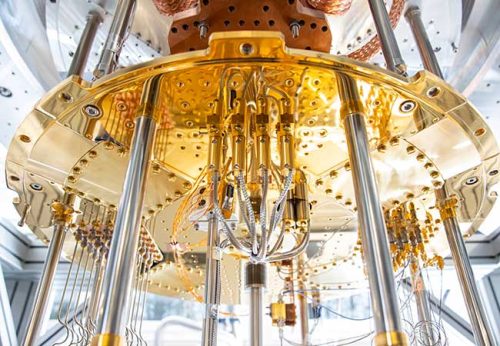Four world-leaders are joining forces for pushing the realisation of quantum computers and their integration in HPC systems forward: Forschungszentrum Jülich, Goethe-University Frankfurt, ParTec and Quantum Machines have partnered for developing a 10+ superconducting qubit system and integrating it into the supercomputing infrastructure of the Jülich Supercomputing Centre. The collaboration now passed the first milestone by finishing work package 1. It was started in summer 2023.

ParTec’s component-based strategy is aimed at accelerating quantum innovation and implementation by utilizing a best-of-breed approach. As such. work package 1 covers the integration of a QuantWare chip based on the 25 qubit Contralto technology in a Bluefors cryostat provided by Forschungszentrum Jülich and in the OPX quantum control environment of Quantum Machines. The integrated system was successfully calibrated and seamlessly managed using the QBridge software into JURECA, a Pre-Exascale Modular Supercomputer operated by Jülich Supercomputing Centre at Forschungszentrum Jülich.
In work package 2 the solution will be tested and benchmarked. As a further outcome, software engineers of ParTec will work on new functionalities of and integration with ParTec’s ParaStation Modulo, a software that allows system managers to operate a collection of modules as a single system and users to run massively parallel jobs. Additionally, the partners will develop a task-parallelism software solution using the OmpSs programming model.
Earlier this year, ParTec and Quantum Machines unveiled QBridge, a software co-development for seamlessly embedding high-performance and quantum computers. QBridge provides a secure, efficient, and familiar environment for large HPC centers, cloud providers, and research groups seeking to integrate quantum computers into their existing infrastructure. Enhanced with ParTec’s ParaStation Modulo software suite, QBridge facilitates modular computing capacity between classical high-performance computing resources and quantum computing resources.
About Forschungszentrum Jülich: The Jülich Supercomputing Centre at Forschungszentrum Jülich began operating the first German supercomputing centre in 1987. At the Jülich Institute for Advanced Simulation, it continues the long tradition of scientific computing at Jülich. It currently operates one of the most powerful computers in Europe, JUWELS, and provides the first European infrastructure for quantum computing, JUNIQ. JSC will also be home to the first European exascale computer, which will be the first supercomputer in Europe to surpass the threshold of one trillion computing operations per second.
About Goethe-Universität Frankfurt: Established in 1914 as a foundation university with funding from Frankfurt’s citizens, Goethe University is embedded in a highly participatory and supportive environment. Together with the Technical University of Darmstadt and Johannes Gutenberg University Mainz, Goethe University Frankfurt operates the strategic Rhine-Main Universities alliance (RMU). Research at Goethe University is structured into six profile areas spanning the humanities, social sciences, economics, natural and life sciences, as well as medicine. Goethe University delivers contributions to meet the challenges of the 21st century and acts as a driving force for the progressive development of society, politics, and business. www.goethe-university-frankfurt.de/
About Quantum Machines: Quantum Machines (QM) drives quantum breakthroughs that accelerate the realization of practical quantum computers. The company’s Quantum Orchestration Platform (QOP) fundamentally redefines the control and operations architecture of quantum processors. The full-stack hardware and software platform is capable of running even the most complex algorithms right out of the box, including quantum error correction, multi-qubit calibration, and more. Helping achieve the full potential of any quantum processor, the QOP allows for unprecedented advancement and speed-up of quantum technologies as well as the ability to scale to thousands of qubits. Visit us at: www.quantum-machines.co
About ParTec AG: ParTec AG specializes in the development and manufacture of modular supercomputers and quantum computers as well as accompanying system software. Its offering includes the sale of pioneering High-Performance Computers (HPC) and Quantum Computers (QC) as well as consulting and support services in all areas of the development, construction and operation of these advanced systems. The dynamic Modular System Architecture (dMSA) approach is a unique and successful feature of ParTec AG, which has proven particularly successful for the complex requirements of massive computing power in AI. Further information on the company and ParTec AG’s innovative solutions in the field of high-performance computing and quantum computing can be found at www.par-tec.com.
Contact:
Professor Thomas Lippert
Modular Supercomputing and Quantencomputing, Goethe University
Frankfurt Institute for Advanced Studies and Forschungszentrum Jülich
Tel. +49 (0)69 798-25256
t.lippert@em.uni-frankfurt.dehttps://msqc.cgi-host6.rz.uni-frankfurt.de
https://msqc.cgi-host6.rz.uni-frankfurt.de
https://www.fias.science/de/fellows/detail/lippert-thomas
https://www.fz-juelich.de/profile/lippert_th
Source








